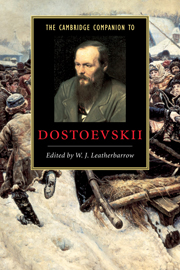Book contents
- Frontmatter
- 1 Introduction
- 2 Dostoevskii and the Russian folk heritage
- 3 Dostoevskii and literature
- 4 Dostoevskii as a professional writer
- 5 Dostoevskii and money
- 6 Dostoevskii and the intelligentsia
- 7 Dostoevskii and psychology
- 8 Dostoevskii and religion
- 9 Dostoevskii and the family
- 10 Dostoevskii and science
- 11 Conclusion
- Further reading
- Index
8 - Dostoevskii and religion
Published online by Cambridge University Press: 28 May 2006
- Frontmatter
- 1 Introduction
- 2 Dostoevskii and the Russian folk heritage
- 3 Dostoevskii and literature
- 4 Dostoevskii as a professional writer
- 5 Dostoevskii and money
- 6 Dostoevskii and the intelligentsia
- 7 Dostoevskii and psychology
- 8 Dostoevskii and religion
- 9 Dostoevskii and the family
- 10 Dostoevskii and science
- 11 Conclusion
- Further reading
- Index
Summary
Dostoevskii was a Christian novelist. Some readers will regard this as a simple statement of an obvious truth, while others may regard it as a denial of all that is modern and of enduring importance in his work. On one thing both camps will agree, however. Dostoevskii, and his novels, take the claims of religion seriously on its own terms: religion does not occupy the peripheral place that it does in most notable English novels of the period. Moreover, Christianity, both in his life and his work, was engaged in pitched battle with the most desolate atheism. In Dostoevskii, neither is of that untroubled, optimistic variety which is often held to be characteristic of the Victorian age. Only towards the end of his life, while writing The Brothers Karamazov, was he able to comment in his notebook with some semblance of tranquillity that he had reached faith ('moia osanna') through a furnace of doubt ('gornilo somnenii') (xxvii, 86). Awaiting his own execution on the Semenovskii Square in 1849, he had murmured the words: 'Nous serons avec le Christ' (We shall be with Christ). His companion, the atheist Speshnev, had rejoined dryly: 'un peu de poussière' (specks of dust). Whatever thoughts on life and death had passed through Dostoevskii's mind before this moment, the burden of Speshnev's words, in one form or another, refused thereafter to go away.
- Type
- Chapter
- Information
- The Cambridge Companion to Dostoevskii , pp. 148 - 174Publisher: Cambridge University PressPrint publication year: 2002
- 1
- Cited by

